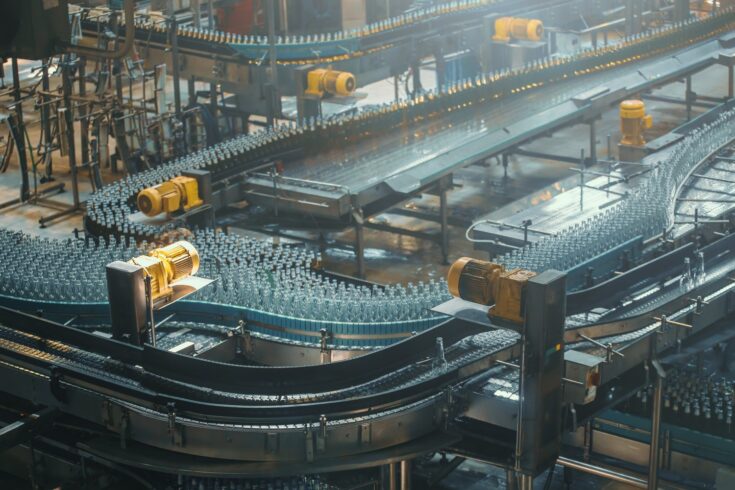World leaders in stainable materials production
The UK is world leading in developing technologies and processes which will unlock sustainable materials production, enabling the UK to reach net zero. UK Research and Innovation’s transforming foundation industries challenge is supporting these technology developments, scale up and adoption through a series of grant funded projects and innovation support programmes.
The UK has confirmed targets of achieving net zero by 2050. This will only be achieved if manufacturing supply chains, and specifically the foundation industries, decarbonise. These industries comprise:
- glass
- metals
- ceramics
- cement
- paper
- chemicals.
They contribute 10% of all of the UK’s carbon dioxide emissions, a story echoed worldwide.
1.6 million people
The foundation industries in India play an even bigger role in the domestic economy, directly employing around 1.6 million people. All sectors have been experiencing growing local demand as Indian society is attaining more wealth and disposable income. This is coupled with the increase in public sector investment in buildings and infrastructure across India.
The sustainability challenges facing Indian companies are similar to the UK. Indian industry currently has a high dependence on fossil fuels, particularly coal and coke, to power the majority of plants. High greenhouse gas emissions as a result are only being partially offset by ongoing investments regionally in:
- solar
- biomass
- wind energy
- clean electricity generation.
But this means the solutions are also common, and there is a clear need to take a broader, cross sector, international approach across supply chains to address these challenges. The only way to achieve this transformational change in how materials are sourced and processed, and the types of products manufactured, is to tackle this globally. This ensures there is no offshoring of any nation’s carbon.
International collaboration between governments, companies and research institutes is essential for ensuring these sectors remain competitive while reducing their environmental impact. Government involvement is also needed to support the right policies, permits, legislations and funding, all key to achieving net zero objectives.
Never has this been more pressing than following the United Nations Climate Change Conference (COP26) commitments. And more opportune than with the current UK trade agreement being negotiated with India with a strong focus on innovation.
The approach to collaboration
This year, the transforming foundation industries challenge embarked upon an exploration of collaboration potential with India.
This composed a Global Expert Mission (GEM), delivered by the Innovate UK KTN, and a lab-to-lab programme.
The aims of the mission were to:
- provide insights into where there are synergies between the two countries
- determine appetite for collaboration
- capture key research and innovation opportunities.
The aim of the funded programme was to develop closer ties between research in the two countries and to identify common challenges. But it also looked at the potential business case for the development of new technologies and processes that will provide solutions to some of the core issues faced by these industries.
The GEM
A delegation of 30 distinguished industry leaders and academics from each nation came together for a week of open, honest, bilateral discussions around three critical areas, key to achieving sustainability:
- energy efficiency
- resource efficiency
- enabling technologies, for example digital.
Inspiring delegates
The week began with a positive welcome from both nations. Challenge Director Bruce Adderley gave a brief outline of the challenge and our interest in collaborating with India.
This was followed by an introduction from our counterparts, Council for Scientific and Industrial Research, India where Dr Rama Bansal introduced their interests and Dr Anand Mohit outlined:
- the wide ranging expertise of the labs
- areas where collaborations are already occurring with the UK
- project areas of potential interest to the UK foundation industries.
Finally, Kevin McCole, Managing Director of the UK India Business Council gave an inspirational talk. The talk set the scene for areas of collaboration, highlighting excellence in both nations, and the commitments from both governments in terms of willingness and wider agreements.
All three talks sent a strong message for collaboration, openness, and knowledge exchange. Throughout the week both the UK and India outlined common goals and objectives as both countries seek to decarbonise their industries.
Establishing common language
As the term “foundation industries” is not one widely used globally, we took the opportunity within the GEM to bring each foundation industry together individually to start discussions on common ground. UK and Indian industrial experts from each sector had a chance to:
- meet each other
- explore commonalities and differences in:
- their markets
- innovation drivers
- state of the art technologies
- barriers to further sustainable growth.
In all of the discussions, there were lots of commonality and opportunities for collaboration. There was particular interest in:
- waste utilisation
- industrial symbiosis
- next generation clean energy sources
- plant efficiency and waste heat utilisation
- digital techniques to enable process efficiency
- standards and legislation.
Connecting across sector boundaries
Moving into cross-sector discussions, we saw a true shift in dynamics and excitement around the opportunity to share between traditional sector boundaries and explore areas of synergy.
Under the area of resource efficiency, we had some great discussions. Amongst other topics, we discussed how to understand the current geography of waste streams to consider the feasibility of industrial symbiosis and where carbon capture and utilisation could come into play.
Our final day brought discussions under the theme of energy efficiency with focus on:
- digital techniques and technology transfer from other sectors
- industrial symbiosis for best use of heat
- being adaptable to long term technologies such as the use of alternative fuels.
On both sides we have challenges around the age of plants, energy issues, and opportunities to be more efficient with the use and re-use of resources. There have been areas where the UK leads in the development of processes and technologies, and also areas where the UK can learn from.
A number of times, we heard that “all of the quick wins have already happened”, and only with cross-sector and through-supply chain learning will we achieve more. This resonates so closely with the transforming foundation industries challenge aims and has really “cemented” (excuse the pun) our thoughts and priorities.
We have also seen great urgency in progressing both the energy and resource efficiency agendas for both nations.
Full details of the discussions from the GEM can be seen in this report: transforming foundation industries in India (PDF, 1.45MB).
Taking a closer look
The lab-to-lab programme saw seven projects explore specifics of collaboration topics with India. A number of approaches were taken. Some projects focused on mapping the extent of challenges, data and capabilities across a certain sector, while others developed prototypes and proof of concept studies for sustainable alternative materials and technologies.
In each case though, building a wider network for research and collaboration was at the heart of the project. A number hosted substantial virtual workshops with key stakeholders from both countries. It brought together a new knowledge sharing opportunity that will help ensure potential solutions and innovations are appropriate and effective in the real world at all stages.
Details of all seven projects can be found in this report: Transforming foundation industries lab-to-lab projects with India.
Continuing the discussions
Although it is a shame that ongoing COVID-19 concerns prevented us from meeting physically, we have been very impressed at the quality of discussions we have been able to have. And the opportunity to bring together a wide range of experts from across the UK and India which wouldn’t have been possible in a week of face-to-face meetings.
We continue to bring this network together with virtual events planned late summer and missions to the UK and to India planned for later this year. Keep an eye on the Innovate UK KTN site for further details.
After the positivity of discussions for collaboration, we are planning a funded bilateral opportunity to address these challenges in 2023. So thank you to all of those involved, and plenty of further opportunity for others to get involved.
The transforming foundation industries challenge is delivered by Innovate UK.
Top image: Credit: DedMityay, iStock, Getty Images Plus via Getty Images




